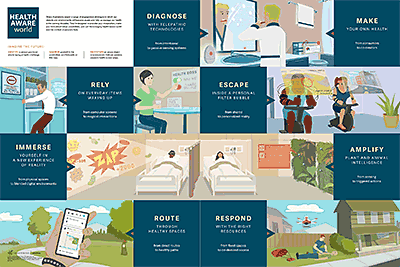Health Aware World Map

Health Aware World Map
Transforming health by bringing objects and environments to life
An astounding array of everyday objects—from food to furniture, buildings to bodies—is becoming interconnected across environments and scales. Over the next decade, as more than 50 billion objects become connected, they will take us beyond today’s landscape of wearable technologies and usher in a world of health-aware environments, where we can enlist homes, cars, clinics, and entire cities to support our health and well-being. As our world becomes aware and responsive, it will open up new opportunities to transform how we engage people in managing their health.  Responsive spaces and objects will create new opportunities to overcome personal and public barriers to engagement. They will suggest new approaches to behavior change and ways to manage health outside traditional clinical settings. Our health-aware world will engage us at just the times and places we need or seek help.
Responsive spaces and objects will create new opportunities to overcome personal and public barriers to engagement. They will suggest new approaches to behavior change and ways to manage health outside traditional clinical settings. Our health-aware world will engage us at just the times and places we need or seek help.
Perhaps more critically, opportunities will open up to move beyond a focus on increasing motivation toward expanding tools, services, and strategies that nudge us and shape our behavior through subtle, ambient reminders. By building in the most subtle ambient reminders, our health-world will lower barriers to engagement. And as open-source technologies and maker communities lower the barrier to entry in creating a health-aware world, the most engaged may not be those with the most resources. Tensions will inevitably arise as we apply these tools. We might come to rely too much on devices for decision-making, or choose to escape too often into virtual realities. We may risk losing touch with the physical world.
Despite these tensions, the potential of a healthaware world is one in which aware objects and environments can help us manage our health in more persuasive and personalized ways. Use this map as a source of inspiration to imagine new tools, services, and strategies in a health-aware world.
Learn More
For more about IFTF's Health Futures Lab and research, contact:
Sean Ness | sness@iftf.org | 650.233.9517




